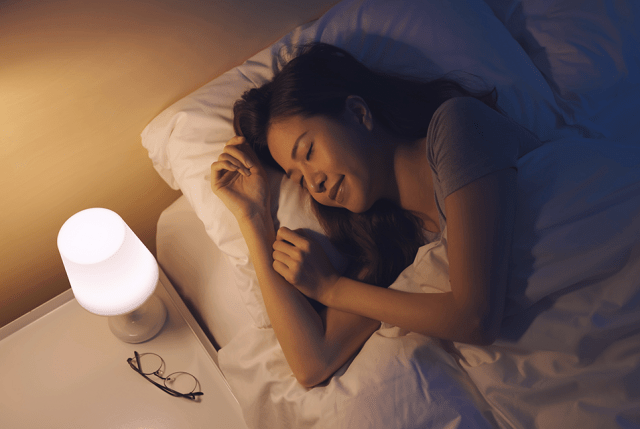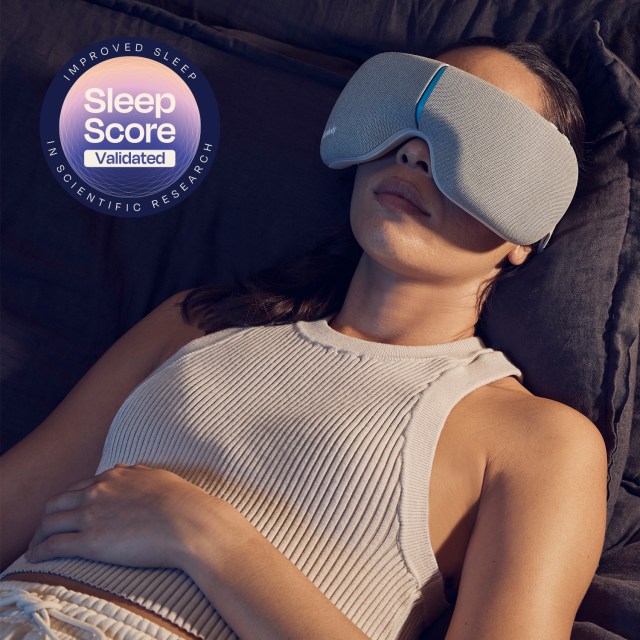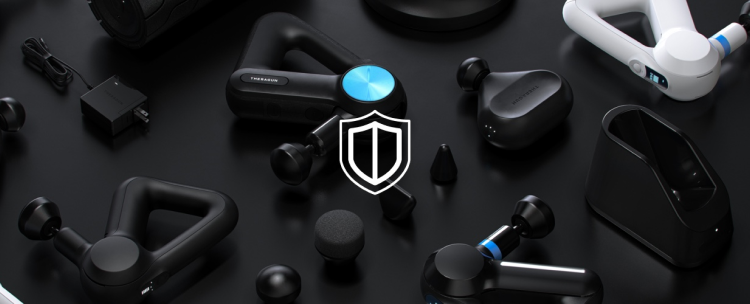Authors: Therabody Scientists: Tim Roberts, MSc; Kyle Silvey, PhD; Michelle Darian, MS, MPH, RD, LDN
A new study shows that SmartGoggles work — those who use SmartGoggles before bed improved multiple measures of sleep and felt more relaxed and less stressed than at baseline.
Therabody’s SmartGoggles look like a pair of goggles yet provide therapeutic benefits to the eyes and temples. The device simultaneously delivers a gentle eye and temple massage through vibrating motors and gentle heat to soothe and relax the body and mind. And using SmartGoggles before bed can prepare the body for a good night’s rest.
Read more about the study that confirms the sleep benefits of using Therabody SmartGoggles.
Why Is Sleep Critical To Wellness?
Everyone can agree that getting a good night’s rest is a critical component of any wellness routine. From the professional athlete to the executive to the parent, we all perform better when well-rested. Here are just a few of the health benefits of a good night’s sleep:
- Cognition: Sleep can help to improve cognitive function — it enhances memory, learning, and concentration. [1]
- Hormone regulation: It also plays a role in regulating hormones, including those responsible for appetite and satiety. [2]
- Immune function: Sleep supports immune function and reduces inflammation in the body. [3]
- Chronic disease risk: Sufficient sleep can also help prevent chronic diseases like heart disease, diabetes, and depression and can even lead to a longer life expectancy. [4, 5]
- Performance + recovery: Sleep is also important for athletic performance and recovery, as it allows muscles to repair and grow. [6]
- Stress + mood: There is also a strong, bidirectional connection between stress and sleep. High levels of stress can make it difficult to fall asleep and stay asleep, leading to poor sleep quality, and poor sleep can lead to higher stress levels during the day. [7]
And while one night of sleep will likely not throw off your wellness, when poor sleep is compounded over time, it can start to impact many aspects of overall health critically. So, consistent quality rest is essential to prioritize consistently.
How Can You Support Getting Quality Sleep?
Despite the vast data on the importance of sleep, 1 in 3 Americans fails to get the recommended 7-9 hours of sleep per night. And while many turn to pharmacological and other pricey interventions to help improve sleep, technology that enhances the body’s natural processes that help drift off to sleep is emerging.
Studies show that gentle, rhythmic vibrations can help to support getting quality sleep. Think back to the practices that help to encourage a baby to fall asleep — the gentle rocking of a rocking chair or a smooth ride in a car can help to lull a baby to sleep. In fact, the same may be true for adults. Studies show that vibration can help relax the body, helping to fall asleep faster and get more restful sleep. [8, 9, 10]
To test the age-old theory that gentle vibrations can aid sleep, SleepScore Labs — a leader in sleep research and innovation — investigated the impact of Therabody’s SmartGoggles, which delivers gentle vibrations and heat to the eyes and temples, on subjective and objective measures of sleep, stress, and relaxation. Here’s how the study was conducted and what they found.

How Was The Study Conducted?
The study included 20 healthy participants with poor sleep. At baseline, on average, these 20 participants got less than five and a half hours of sleep per night. Those with poor baseline sleep have a greater need to improve their sleep and more room for improvement.
Participants slept at home as usual for three weeks and tracked their baseline sleep metrics using SleepScore Max (a sleep metric tracking device). Then, they used Therabody SmartGoggles each night before bed for three weeks while continuing to track their sleep metrics. Self-reported questions on stress, anxiety, and relaxation were completed twice daily during the six-week study, once in the morning and once in the evening, following use of Therabody SmartGoggles before bed. And these findings were validated against the brief version of the State-Trait Anxiety Inventory (a questionnaire that commonly measures anxiety in research settings), which was administered before and after the intervention period. The study compared sleep outcomes within each participant at baseline and follow-up during the same period.
The Study Showed That Therabody SmartGoggles Improves Sleep and Stress
SmartGoggles Helped Participants Improve Sleep Quality, Sleep Duration, and Deep Sleep
The study found that using Therabody SmartGoggles before bed can improve sleep quality. Research participants who wore the SmartGoggles before bed for three weeks had longer sleep duration, spent more time in restorative deep sleep, and woke up fewer times after initially falling asleep compared to their baseline sleep patterns without SmartGoggles. They also reported improved sleep quality and woke up feeling more refreshed after using the SmartGoggles. At follow-up, SmartGoggles users experienced:
- More Time Asleep: Participants got, on average, 4% more sleep when using SmartGoggles before bed — going from about 5.5 hours per night to about 5.75 hours per night, a daily increase of about 12 minutes. While 12 minutes may not sound like a lot more sleep per night — this equates to more than six additional hours of sleep per month. Additions, albeit incremental, can add up to notable improvements in sleep duration and wellness.
- More Deep Sleep: Participants got, on average, 10% more (6 minutes per night) of deep sleep when using SmartGoggles compared to baseline. And when it comes to restorative sleep, each bit matters. To put it into context, an additional 6 minutes per night over one month equates to over three more hours of deep sleep per month. Deep sleep also accounted for a larger proportion of participant’s night’s sleep (7% relative increase).
- Fewer Night-Time Awakenings: The frequency at which participants woke up throughout the night decreased by an average of 7% when using SmartGoggles before bed. And when they did wake up throughout the night, they spent 10% less time awake.
- Better Self-Reported Sleep Quality: Participants self-reported improvements in sleep quality, a 23% increase compared to baseline, and felt more well-rested in the morning, also a 23% increase after using SmartGoggles before bed.
Study participants did not report any adverse events or side effects associated with using SmartGoggles.
SmartGoggles Helped Participants Feel Less Stressed and Anxious and More Relaxed
Not only did using SmartGoogles immediately before bed improve sleep measures, but participants also reported feeling less anxious, less stressed, more relaxed, and sleepier than before using SmartGoggles. Here is what the study found:
- 82% of SmartGoggles users reported feeling less stressed.
- SmartGoggles users reported a 19% increase in feelings of relaxation.
- 71% of SmartGoggles users reported feeling less anxious. These findings were also corroborated using a brief version of the State-Trait Anxiety Inventory. [11]

Participants Enjoy Using Therabody SmartGoggles
Arguably, one of the most important aspects of any wellness habit is whether or not you enjoy it. We all have those things we know we should do because it can benefit our health – but we don’t because it’s complicated, unenjoyable, or hard to fit into a daily routine.
This wasn’t the case for SmartGoggles. Participants in the study unanimously reported that they enjoyed using SmartGoggles and agreed that the device helped them feel more relaxed.
Key Takeaways
The study on Therabody’s SmartGoggles found that using the device before bed:
- Improves sleep quality, sleep time, and physically restorative deep sleep
- Reduces frequency of awakenings and time spent awake in the night
- Participants felt less anxious and stressed and more relaxed
References:
- https://pubmed.ncbi.nlm.nih.gov/21532950/
- https://pubmed.ncbi.nlm.nih.gov/21532950/
- https://pubmed.ncbi.nlm.nih.gov/36404495/
- https://pubmed.ncbi.nlm.nih.gov/21835655/
- https://pubmed.ncbi.nlm.nih.gov/35881527/
- https://pubmed.ncbi.nlm.nih.gov/27067616/
- https://pubmed.ncbi.nlm.nih.gov/28673415/
- https://pubmed.ncbi.nlm.nih.gov/22900457/
- https://pubmed.ncbi.nlm.nih.gov/31554268/
- https://pubmed.ncbi.nlm.nih.gov/33367712/
- https://ieeexplore.ieee.org/document/9086332
- https://www.ncbi.nlm.nih.gov/pmc/articles/PMC2776769/







